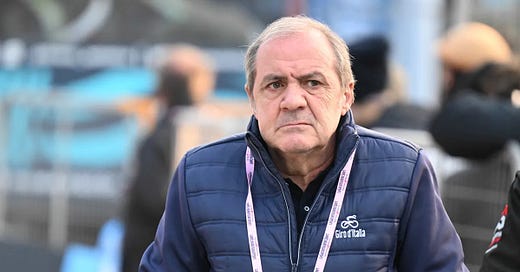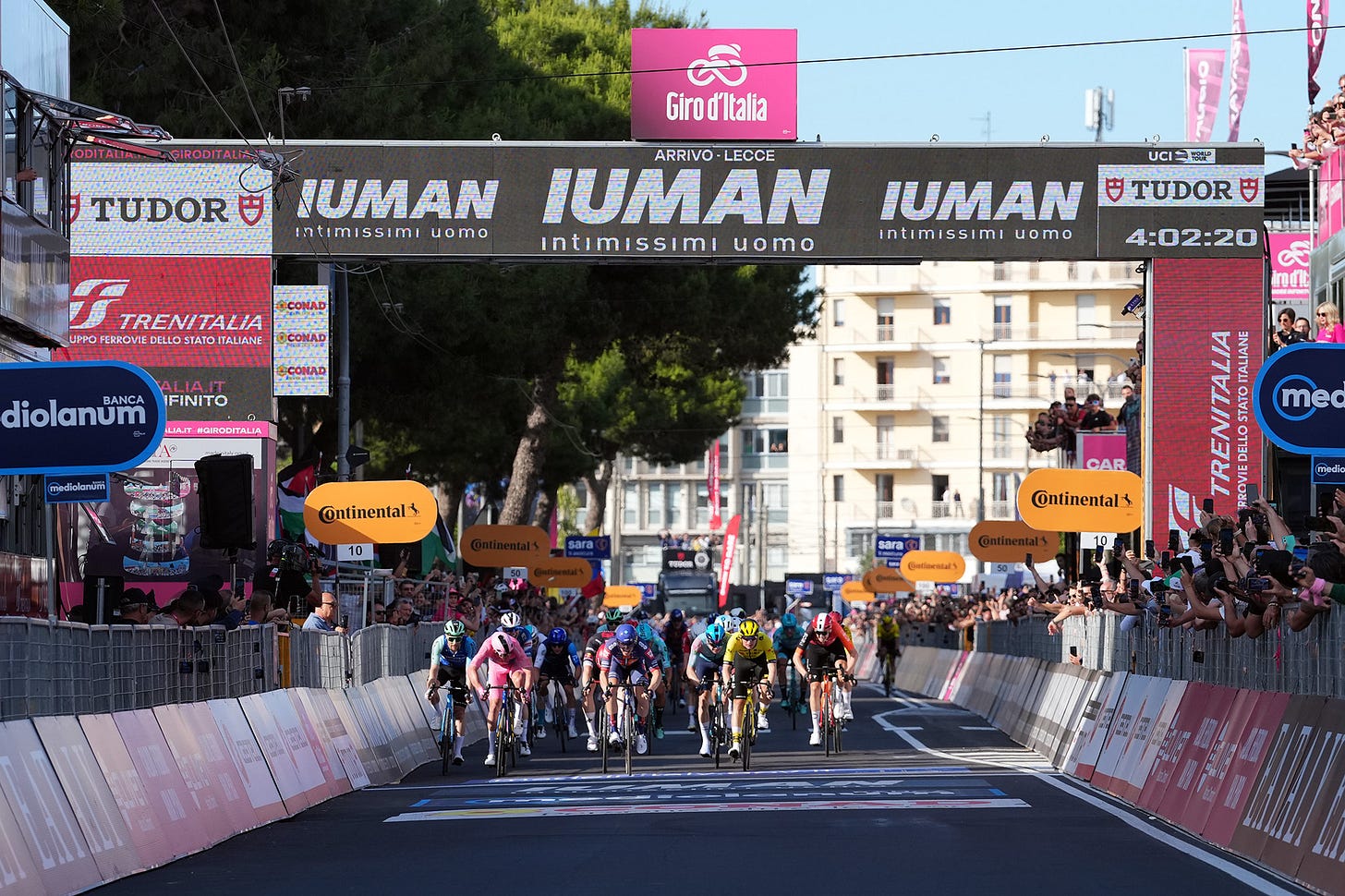Vegni is right, Vegni is wrong
Flat stages in cycling have gone from occasional boredom to anti-competitiveness. And we’ve reached a point of no return.
Mauro Vegni, director of the Giro d’Italia, used the race’s start in Albania to complain about the riders’ lack of initiative and the absence of real battles among the general classification favourites. The fact that Pedersen won two stages, despite how well he’s been climbing this year, still speaks volumes about how those stages unfolded.
Mauro Vegni is right… though not quite. The paradox is simpler than it seems: the Giro lacks competitiveness. And while that’s not exclusive to this race, one might well ask how much of that is down to Vegni and RCS, given the route they designed. I won’t repeat the criticisms I already made in the preview of the first nine stages, but his constant statements and complaints feel like a mix of contradiction and frustration.
The tedium felt by teams and riders sets in particularly during the flat stages. It's a recurring feature of modern cycling and isn’t limited to this edition of the Giro, which yesterday saw its first mass sprint finish in Lecce.
For many teams, getting into breakaways that are almost certainly heading for a sprint is seen as a waste of energy. I can understand that, just as I can understand Vegni… though to me, it seems rather naive.
Only Polti VisitMalta, through the Spaniard Fran Muñoz, made an effort to be seen, leading a solo breakaway with a predetermined time of death. I wonder what went through the minds of all those teams without a genuine general classification contender or a truly powerful sprinter.
The invited teams refuse to play the role of mere entertainers for the fans, as Tudor and Q36.5 boast a level of talent and status comparable to several WorldTour teams. As a result, stages like yesterday’s are left to Polti and Bardiani to send someone up the road at best.
I believe it’s a problem in modern cycling, even if things weren’t necessarily much better in the past in this regard. Some teams head straight for the slaughter, others hold back until more favourable days come along, and some take out the calculator and, based on the effort-to-UCI-points ratio, would rather settle for 13th place in a sprint than fight it out in a breakaway with little chance of success.
Yesterday, as I was watching the stage, I thought of Simon Pellaud, who gave me a wonderful interview earlier this year. In that conversation, he told me that at Tudor they no longer allowed him to join breakaways as often, despite it being his speciality, due to the demands imposed by UCI points.
It's a topic I’ve delved into on previous occasions, such as when I analysed, alongside Raúl Banqueri, the potential benefits of a system that is shaping the way races are ridden, how riders are signed, and how calendars are chosen – or not.
Yesterday’s surprising victory by Casper van Uden was significant. The Picnic rider stunned everyone in a disorganised, chaotic, and highly dangerous sprint: sharp squeezes, constant turns, islands in the middle of the road and a final loop that doubled the chances of disaster.
Bram Welten, who made a brilliant leadout for van Uden's first WT win, jokingly said after the race that the best thing about the victory was the 180 UCI points. Ah. Despite the tone and context, the issue of points is starting to wear me out, and it has taken on a dimension that’s beginning to distort cycling itself.
In any case, it’s a paradox that it was Picnic, through van Uden, who took the big prize. It’s a team that has focused on developing young talents like Poole, Onley, Andersen, Vermaerke and van Uden himself, mostly through their devo team. They have always prioritised major goals over the scattered harvest of UCI points in more favourable scenarios. A team that's inflexible... but with a clear vision. I'm happy for their victory.
Last year, there were 8 stages in the Giro with a maximum of 2.000 meters of positive elevation, potentially favourable for a sprint. Out of these, 7 ended in a mass sprint. Only one breakaway succeeded, and for most of the days, the escape was barely noticeable.
It's a problem faced by all the major organisers and some are starting to solve it by limiting mass finishes to the bare minimum. It's a shame. I believe in the potential of flat stages to deliver excitement beyond windy days when echelons can form, and I enjoy a good sprint just as much as a finish on a murito. But the peloton is earning this factual punishment of minimising the most common terrain in any country: the flat.
I think the Giro has missed the opportunity to propose something different. While, of course, better days will come, starting with stage 5 today, I feel they have renounced their essence of big climbs out of fear of the weather... and of the peloton's strikes, without innovating or being creative with a route that's unimaginative and concentrates the hard stages in the final week, except for a couple of colourful moments, like the sterrato stage through Siena.
The Giro no longer has the star attraction it once had and it’s not the ‘guardian of essence’ it seemed to be for decades.
In any case, races, even the most promising on paper, always come down to the legs of the cyclists. Hopefully, we’ll see a better spectacle than expected or than the last 5 editions. But, if I may offer a piece of advice, Mauro, next time, put a bit more meat on the menu and you’ll avoid complaining about the inevitable in today’s cycling.
Now it's your turn!
🔔 Enjoying the ride? The best way to stay up to date is to subscribe now so you don’t miss a single update.
❤️ Share it with someone who loves cycling just as much as you do!
You can also follow Cycling Report on Twitter, Instagram or Bluesky, and find more on my personal account.





There used to be many more dead flat stages in the grand tours of the 1960s and 1970s of much greater length with the peloton trundling along taking it easy, but these longueurs weren't on TV,. Now, with coverage from the start of the race, we have some boring days now and then, but the peloton can't race flat out all the time. The solution to encourage breakaways is very simple - hand out UCI points for a couple of intermediate sprints along the way on every stage. This would mean the minor teams would always want to get out there, and would actually compete for the sprint points, rather than rolling over for a hundred euros here or there.
I agree that with one eye on the UCI points the riders that are being "developed" are not getting the full experience. Not being able to go up the road is a skill that the majority of the young talent is going to need in order to have a long and successful career in cycling. They need reps and unfortunately it sounds like they aren't getting them because the teams would rather sit back and shoot for a top 10.